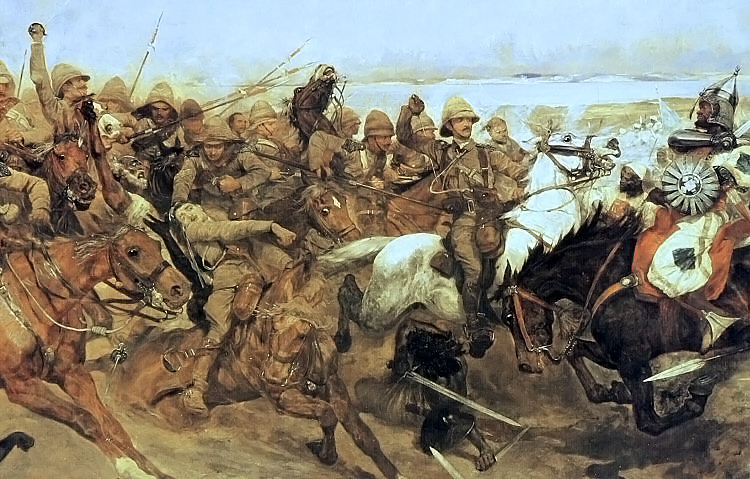
Churchill Quotes: “Action vs. Inaction….Religion of Blood and War”
N.B. We do not see Churchill in Woodville’s dramatic painting above. He had drawn his pistol not his sword, in deference to his weak right shoulder. For the skill and dexterity it took to sheath his sword and aim his pistol, see my review of Brough Scott’s Churchill at the Gallop (with Ben Bradshaw’s painting of Churchill in the charge.)
Action and inaction
Q: Could you verify the correct wording for the Winston Churchill statement: “I never worry about action, but only inaction.” There are various iterations among the sources. —S.D.
From Churchill by Himself, page 190 (note he placed quotemarks around “worry”): “I never ‘worry’ about action, but only about inaction.”
Reference: 1940s, passim. Martin Gilbert, The Churchill Documents, Vol. 15: Never Surrender, May 1940-December 1940 (Hillsdale, Mich.: Hillsdale College Press, 2011). In his preface, page xvi, Sir Martin writes of Churchill:
Inefficiency, incompetence and negative attitudes roused his ire…. He did not take kindly to what he called “a drizzle of carping criticism.” [He despised those who] “failed to rise to the height of circumstances.” Among his injunctions to his Ministers were, “Don’t let this matter sleep,” and, “I never ‘worry’ about action, but only about inaction.”
There are several appearances of the quotation. Here is one in a letter, on page 1184 of the above work: Concerning “Operation Compass,” the first major British offensive in North Africa. Churchill wrote to General Dill on 7 December 1940:
…If, with the situation as it is, General Wavell is only playing small, and is not hurling on his whole available forces with furious energy, he will have failed to rise to the height of circumstances. I never “worry” about action, but only about inaction.
“Religion of blood and war”
Q: Did Churchill refer to Islam as “the religion of blood and war”? —I.L.
Yes, in his first book, The Story of the Malakand Field Force (London: Longmans Green, 1898). Quoting from a newer edition (London: Leo Cooper, 1991), page 27:
But the Mahommedan religion increases, instead of lessening, the fury of intolerance…. The prospects of material prosperity, the fear of death itself, are flung aside. The more emotional Pathans are powerless to resist. All rational considerations are forgotten. Seizing their weapons, they become Ghazis—as dangerous and as sensible as mad dogs: fit only to be treated as such.
While the more generous spirits among the tribesmen become convulsed in an ecstasy of religious bloodthirstiness, poorer and more material souls derive additional impulses from the influence of others, the hopes of plunder and the joy of fighting…. The religion of blood and war is face to face with that of peace.
It would be inappropriate to quote these words out of context because they referred to Pathan warriors 100 years ago. Their worst atrocities, Churchill went on, were against fellow Muslims. There are many examples of his praise of Muslim fighters, notably those in the World War II Indian Army. He considered Muslim Dervishes pictured above “as brave men as ever walked the earth.” Context matters.






